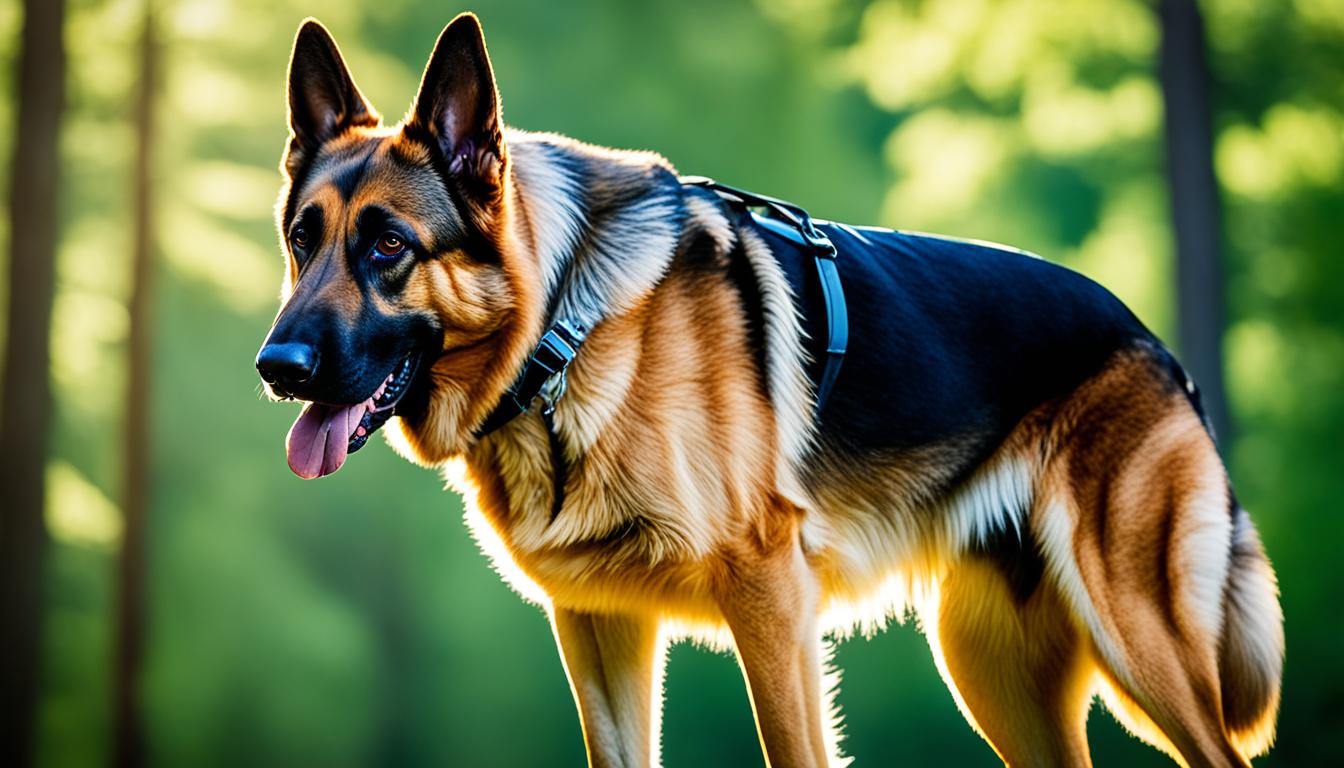Essential German Shepherd Facts & Care Tips
Did you know that German Shepherds are widely used as working dogs in the military and police forces around the world?
These large, muscular, and highly intelligent dogs are known for their confidence, loyalty, and bravery. With an average weight of 50-90 pounds and a height of 22-26 inches, German Shepherds require regular exercise and mental stimulation to stay healthy and happy.
In this article, we will explore everything you need to know about the German Shepherd breed, including their unique characteristics, essential care tips, and expert training advice.
Whether you are considering bringing home a German Shepherd or you already have one as a beloved companion, understanding their needs and providing appropriate care is vital for their well-being.
Join us as we dive into the world of German Shepherds and discover how to ensure a long, happy, and fulfilling life for your furry friend.
German Shepherd Health Concerns
When it comes to German Shepherds, it’s important to be aware of the potential health concerns that can affect this beloved breed. Understanding these health issues can help you provide the best care for your furry friend and ensure their overall well-being.
Degenerative Myelopathy
Degenerative myelopathy is a neurological disorder that affects the spinal cord of German Shepherds, leading to progressive weakness and paralysis of the back legs. Although there is no cure for this condition, early detection and management can help improve the quality of life for affected dogs.
Elbow and Hip Dysplasia
Elbow and hip dysplasia are common orthopedic conditions in German Shepherds. These degenerative joint diseases can be painful and restrict your dog’s mobility. Regular exercise and weight management can help minimize the impact of these conditions and maintain joint health.
Cancer
German Shepherds have a higher risk of developing various types of cancer, including hemangiosarcoma, bone cancer, lung cancer, and intestinal cancers. Regular veterinary check-ups and monitoring for any signs or symptoms of cancer are crucial for early detection and treatment.
Bloat and Gastric Dilation-Volvulus (GDV)
Deep-chested breeds like German Shepherds are prone to bloat, a life-threatening condition where the stomach fills with gas and twists on itself. Immediate veterinary attention is crucial if you suspect bloat in your dog, as it can rapidly progress to GDV, a life-threatening emergency.
Allergies
German Shepherds are susceptible to various allergies, including skin and ear infections. Regular grooming and appropriate flea and tick prevention can help minimize the risk of allergies and keep your dog comfortable.
Heart Disease
Dilated cardiomyopathy is a heart disease that commonly affects German Shepherds. Regular cardiovascular evaluations and a heart-healthy lifestyle, including proper nutrition and exercise, are essential in managing this condition.
Exocrine Pancreatic Insufficiency
Exocrine pancreatic insufficiency is a digestive health issue where the pancreas fails to produce sufficient enzymes for proper food digestion. German Shepherds with this condition require lifelong pancreatic enzyme supplements and dietary modifications to ensure proper nutrition.
Pannus
Pannus is a painful eye condition that primarily affects German Shepherds. It can lead to vision loss if left untreated. Regular eye examinations and prompt treatment are crucial for managing this condition.
Proper puppy care, including socialization, training, and nutrition, plays a vital role in preventing and managing potential health concerns. Providing a balanced diet that meets their nutritional needs and avoiding table scraps is important for maintaining their overall health and well-being.
German Shepherd Care and Training Tips
Keeping your German Shepherd happy and healthy requires proper care and training. Regular exercise is essential for this energetic breed to prevent boredom and destructive behaviors. Daily walks, runs, or play sessions are necessary to keep them mentally and physically stimulated. Providing your German Shepherd with ample exercise will help maintain their overall well-being.
Consistent training and positive reinforcement are crucial for developing a well-behaved German Shepherd. These intelligent dogs are eager to please, making them receptive to training. By using rewards and praise, you can effectively teach them commands and desired behaviors. Remember to be patient and consistent in your approach, as German Shepherds thrive on structure and routine.
Grooming plays a significant role in maintaining the health and appearance of your German Shepherd. Regular brushing helps reduce shedding and minimize matting. Baths should only be given when necessary to prevent drying out their skin and coat. Additionally, it’s important to provide your German Shepherd with a safe and comfortable living environment, including a spacious yard or access to open spaces where they can roam and explore.
Socialization is a critical aspect of caring for a German Shepherd. Properly introducing them to other dogs and people from an early age will help ensure they are well-behaved and confident in various social settings. Exposing them to different environments, sounds, and experiences will contribute to their overall mental and emotional well-being.
By following these care and training tips, you can provide the best possible care for your German Shepherd, ensuring they lead a healthy, happy, and fulfilling life.
FAQ
What are some essential facts to know about German Shepherds?
German Shepherds are large, muscular, highly intelligent, and loyal dogs. They are part of the herding group and are known for their confidence, loyalty, and bravery. This breed requires regular exercise and mental stimulation to stay healthy and happy. They are commonly used as working dogs in the military and police.
What are the average size and weight of a German Shepherd?
German Shepherds have an average weight of 50-90 pounds and a height of 22-26 inches.
How do I care for a German Shepherd?
Caring for a German Shepherd includes training, socialization, and regular grooming. They have a double coat that sheds a lot and requires extra grooming during shedding seasons. German Shepherds have a lifespan of 7-10 years and are prone to health issues such as degenerative myelopathy, elbow and hip dysplasia, cancer, bloat, allergies, heart disease, exocrine pancreatic insufficiency, and pannus.
What should I feed my German Shepherd?
Proper nutrition is crucial for German Shepherds, and they should be fed age-appropriate, high-quality food. They should be fed smaller, frequent meals to prevent bloat.
What health concerns are common in German Shepherds?
German Shepherds are prone to several health concerns including degenerative myelopathy, elbow and hip dysplasia, cancer, bloat, allergies, heart disease, exocrine pancreatic insufficiency, and pannus.
How much exercise does a German Shepherd need?
Exercise is essential for this breed, and they should be provided with ample space and daily physical activity.
Why is socialization important for German Shepherds?
Proper socialization is necessary to ensure a well-behaved German Shepherd, helping them to be comfortable and well-behaved around other dogs and people.
What are some grooming tips for German Shepherds?
Regular brushing helps to reduce shedding and minimize matting. Baths should be given only when necessary to avoid drying out their skin and coat.
How can I provide the best care for my German Shepherd?
By following proper puppy care, socialization, training, nutrition, exercise, and regular vet check-ups, you can provide the best possible care for your German Shepherd.







